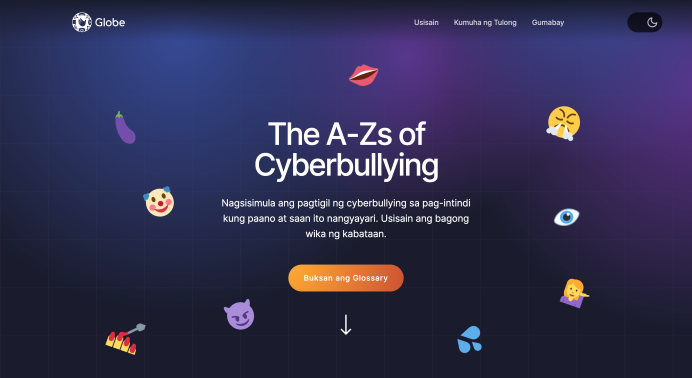A is for apple? Think again. In cyber lingo, as these parents have experienced, the alphabet takes a whole new meaning, but not necessarily all good.

These cyber expressions could range from AMP, a shorter version of a Filipino cuss word, to other derogatory terms.
Or you might have heard someone say “Go KYS” or “Reincarnate.” These are simple but disturbing terms with the harmful intention of telling a person to “kill yourself.”
And sometimes, cyberbullying does not even use letters or words. Instead, people resort to emojis such as a pig face or snout to shame a person for being fat, or a clown to denote stupidity.
Offensive language and emojis, which often victimize users of social media and social messaging apps, do not stop at inflicting emotional pain. It may cause anxiety, fear, and depression that could prove damaging to mental health, especially among kids and young adults. Cyberbullying is also known to lead to negative self-talk and low self-esteem among children.
“To stop cyberbullying, we start with understanding how and where it happens. Parents can protect their children better if they know how young people communicate. Globe is sharing helpful tips on how parents can guide their kids in this new digital environment,” said Yoly Crisanto, Chief Sustainability and Corporate Communications Officer at Globe.
Explore the new language of the youth and learn the A-Z of cyberbullying prevention through Globe’s new portal, makeitsafe.ph, accessible via mobile and desktop browsers. You can talk about the alphabet on the site and how each corresponds to lessons on cyberbullying.
You may even add words you may have heard used in cyberbullying to help expand the glossary.
The portal is part of Globe’s cyber safety advocacy, which runs parallel to its support for the United Nations Sustainable Development Goals, which fosters innovation towards economic development under SDG No. 9, and inclusive and equitable quality education under SDG No. 4.
The country’s leading digital solutions platform has various initiatives to protect people, particularly, minors and the youth, from cyberviolence, which includes bullying, and online sexual abuse and exploitation of children (OSAEC).
Globe also implements the Digital Thumbprint Program (DTP), a series of workshops and modules that teaches students, parents, and teachers about online responsibility and safety. It has been rolling out initiatives under the #makeITsafePH campaign to raise awareness about cybersecurity, partnering with various local and international organizations to block sites that promote OSAEC.
To learn more about Globe, visit www.globe.com.ph.